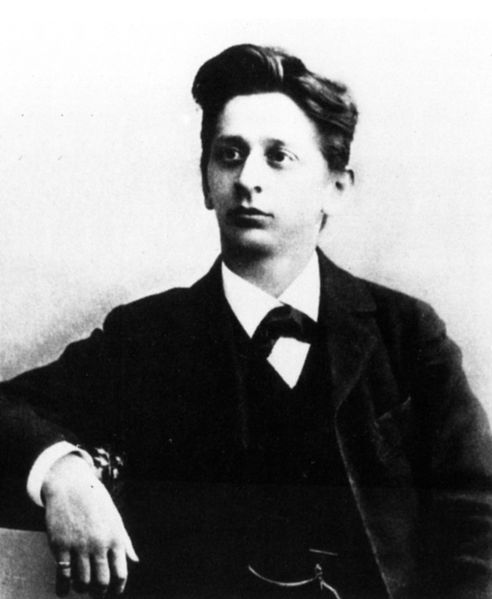
Alexander von Zemlinsky
Born: 1871Died: 1942
Education: self-taught
Career: composer
Alexander Zemlinsky or Alexander von Zemlinsky (October 14, 1871, Vienna – March 15, 1942, Larchmont, New York) was an Austrian composer, conductor, and teacher. Early lifeZemlinsky was born in Vienna to a highly multicultural family. Zemlinsky's grandfather, Anton Semlinski, immigrated from Žilina, Hungary (now in Slovakia) to Austria and married an Austrian woman. Both were from staunchly Roman Catholic families, and Alexander's father, Adolf, was reared as a Catholic. Alexander's mother was born in Sarajevo to a Sephardic Jewish father and a Bosnian Muslim mother. Alexander's entire family converted to the religion of his grandfather, Judaism, and Zemlinsky was born and raised Jewish. His father added an aristocratic "von" to his name, though neither he nor his forebears were ennobled. He also began spelling his surname with a "Z." Alexander studied the piano from a young age. He played the organ in his synagogue on holidays, and was admitted to the Vienna Conservatory in 1884. He studied piano with Anton Door, winning the school's piano prize in 1890. He continued his studies until 1892, studying theory with Robert Fuchs and composition with Johann Nepomuk Fuchs and Anton Bruckner. At this time he began writing music. Zemlinsky had a valuable supporter in Johannes Brahms. In 1893, On the invitation of Zemlinsky's teacher Johann Nepomuk Fuchs, Brahms attended a performance of Zemlinsky's Symphony in D minor. Soon after that, Brahms attended a performance of one of Zemlinky's quartets by the Hellmesberger Quartet. Brahms, impressed with Zemlinsky's music, recommended the younger composer's Clarinet Trio (1896) to the Simrock company for publication. Zemlinsky also met Arnold Schoenberg when the latter joined Polyhymnia, an orchestra in which he played cello and helped found in 1895. The two became close friends and later mutual admirers and brothers-in-law when Schoenberg married his sister Mathilde. Zemlinsky gave Schoenberg lessons in counterpoint, thus becoming the only formal music teacher Schoenberg would have. In 1897 Zemlinsky's Symphony No. 2 (chronologically the third he had written, and sometimes numbered as such) was a success when premiered in Vienna. His reputation as a composer was further helped when Gustav Mahler conducted the premiere of his opera Es war einmal... (Once Upon a Time) at the Hofoper in 1900. In 1899 Zemlinsky secured the post of Kapellmeister at Vienna's Carltheater. Middle yearsIn 1900, Zemlinsky met and fell in love with Alma Schindler, one of his composition students. She reciprocated his feelings initially; however, Alma felt a great deal of pressure from close friends and family to end the relationship. They were primarily concerned with Zemlinsky's lack of an international reputation and by an unappealing physical appearance. She broke off the relationship with Zemlinsky and subsequently married composer Gustav Mahler in 1902. Zemlinsky married Ida Guttmann in 1907, but the marriage was an unhappy one. Following Ida's death in 1929, Zemlinsky married Luise Sachsel in 1930, a woman twenty-nine years his junior, and to whom he had given singing lessons since 1914. This was a much happier relationship, lasting until Zemlinsky's death. Last yearsIn 1906 Zemlinsky was appointed first Kapellmeister of the new Vienna Volksoper, from 1907/1908 at the Hofoper in Vienna. From 1911 to 1927, he was conductor at Deutsches Landestheater in Prague, premiering Schoenberg's Erwartung in 1924. Zemlinsky then moved to Berlin, where he taught and worked under Otto Klemperer as a conductor at the Kroll Opera. With the rise of the Nazi Party, he fled to Vienna in 1933, where he held no official post, instead concentrating on composing and making the occasional appearance as guest conductor. In 1938 he moved to the United States and settled in New York City. While fellow émigré Schoenberg was celebrated and feted in the Los Angeles of the 1930s and 40s – teaching at UCLA and USC and gaining a new generation of acolytes – Zemlinsky was neglected and virtually unknown in his adopted country. He fell ill, suffering a series of strokes, and ceased composing. Zemlinsky died in Larchmont, New York of pneumonia.

